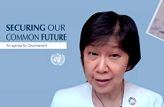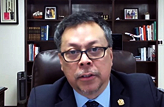December 17, 2021
Jean DuPreez

United Nations High Representative for Disarmament Affairs Izumi Nakamitsu
(Final) Preparations for the Tenth NPT Review Conference: A virtual NPT workshop on 9 December 2021
Following its decades long tradition of hosting track 1.5 type workshops in preparation for Nuclear Nonproliferation Treaty (NPT) Review Conference and Preparatory Committee meetings, the James Martin Center for Nonproliferation Studies (CNS) organized a virtual workshop on 9 December entitled “(Final) Preparations for the Tenth NPT Review Conference” The workshop, hosted virtually by CNS Founding Director, Dr. William Potter, was designed to offer the leadership and a number of delegates to the 10th NPT Review Conference the opportunity to interact with each other and with representatives from civil society on a number of key issues related to the Conference and its outcome. More than 50 individuals, including many heads of delegations, participated in the event, including Review Conference President-designate, Ambassador Gustavo Zlauvinen from Argentina, United Nations High Representative for Disarmament Affairs Izumi Nakamitsu and the Secretary-General of the Conference, Mr. Ioan Tudor.

Ambassador Gustavo Zlauvinen from Argentina
A Different Nuclear Landscape
In her opening remarks High Representative Nakamitsu emphasized that the “nuclear landscape” is vastly different from when NPT parties last reviewed the implementation of the Treaty in 2015. She highlighted alarming trends involving the sharp rise in prominence of nuclear weapons, the risks associated with intersection between nuclear weapons and emerging technologies, and the tendency to pass over transparency and dialogue in favor of opacity and competition. She called on the Tenth NPT Review Conference to serve as a “circuit-breaker” to interrupt the “surge of nuclear danger and avoid a short circuit of catastrophic proportions”.

Syed Hasrin, Permanent Representative of Malaysia to the UN and Chairman of Main Committee I
Ms. Nakamitsu identified 6 key outcomes for the Conference to help reverse current trends: (i) reaffirmation to all of the Treaty’s goals; (ii) a plan to reduce the risk of a nuclear weapon being used, (iii) near-term steps to get us back on the path to a world free of nuclear weapons, (iv) properly resourcing the IAEA safeguards system in terms of human and financial capital, (v) support for dialogue and political resolutions to resolve regional proliferation crises, and (vi) implementing past Review Conference commitments, inter alia, through considering accountability mechanisms.
President-designate Zlauvinen shared his vision for a successful outcome of the Conference and updated participants on preparations and arrangements for the Conference. He listed a number of issues that would impact on the outcome of the conference and called on State party representatives present at the workshop to “help me help you” to bring the Conference to a successful conclusion. In his view, a successful outcome should be both ambitious but pragmatic.

Alexander Marschik, Permanent Representative of Austria to the UN
Two separate panels discussed several key challenges facing the Conference and ways to address them. Looking at where State parties are in their preparations for a successful outcome, four panelists (Syed Hasrin, Permanent Representative of Malaysia to the UN and Chairman of Main Committee I; Alexander Marschik, Permanent Representative of Austria to the UN; Dr. Patricia Lewis, Research Director, Conflict, Science and Transformation, Chatham House; and Benno Laggner, Permanent Representative of Switzerland to International Organizations in Vienna) identified major developments during the past six months that are likely to affect the Review Conference. They also debated how the most contentious issues facing the Conference could be reflected in the outcome document.

Dr. Patricia Lewis, Research Director, Conflict, Science and Transformation, Chatham House
Past Commitments and New Actions
The second panel (Li Song, Permanent Representative of China to the Conference on Disarmament (CD); Aidan Liddle, Permanent Representative of the United Kingdom and Northern Ireland to the CD; and Ms. Maria Antonieta Jaquez, Counsellor at the Permanent Mission of Mexico to the UN) dug deeper into past commitments and possible new undertakings. The panel considered how the Conference should address past commitments, and debated if all past commitments, including the 2010 action plan are still valid, and if not, which ones should be given priority. They also assessed how past commitments could be reflected in the outcome document(s) and debated the issue of whether the Conference should focus on identifying new priority actions with specific deadlines.

Li Song, Permanent Representative of China to the Conference on Disarmament (CD)
Despite a wide range of contentious issues facing NPT State parties and deep differences among them about how to review the implementation of the Treaty and past commitments, discussions at the Workshop generally were very constructive. Hopefully, a similar atmosphere will prevail at the Review Conference next month.
NTP Briefing Book

Ms. Maria Antonieta Jaquez, Counsellor at the Permanent Mission of Mexico to the UN
As part of its ongoing service to NPT parties and analysts, CNS, in partnership with the Centre for Science and Security Studies (CSSS) at King’s College London, released a new edition of the Non-Proliferation Treaty Briefing Book online. The “NPT Briefing Book” is widely used by Review Conference delegates in preparation for and during the Review Conference and its Preparatory Committee meetings. A limited number of printed copies of the Briefing Book will also be available at the Review Conference.
